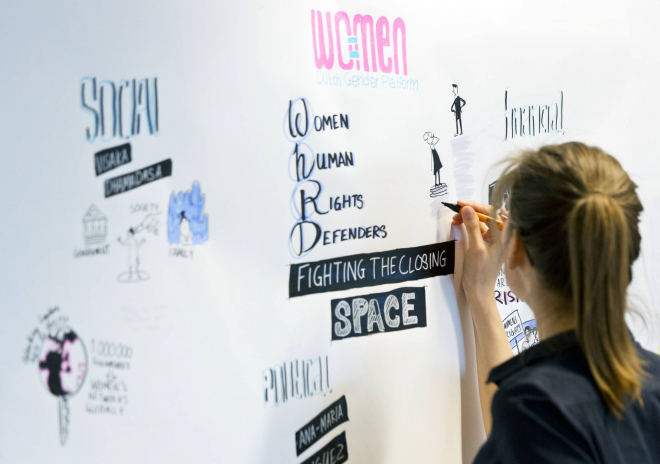
Women make up more than half of the world's population. Yet women and girls still often face discrimination and violence, and in many countries they do not have access to healthcare. To address these issues, the UN developed the fifth Sustainable Development Goal (SDG 5). WO=MEN Dutch Gender Platform monitors, supports and coordinates the implementation of SDG 5 in and by the Netherlands when necessary.
What are SDGs?
The SDGs (Sustainable Development Goals) are seventeen goals to make the world a better place by 2030. The SDGs have been agreed by the countries that are members of the United Nations (UN), including the Netherlands.
The goals were established based on global input from organisations and individuals. In SDG 5, countries agreed, among other things, to reduce violence against women and to work towards equal pay for work, labour participation and a better position for women in business and government.
The Sustainable Development Goals started in 2015 and will run until 2030. They are a global compass for challenges such as poverty, education and the climate crisis. They are the successors to the Millennium Development Goals, which ran from 2000 to 2015.
Why SDG 5?
According to the Dutch Constitution, the Universal Declaration of Human Rights, the European Convention on Human Rights, the Convention on the Elimination of All Forms of Discrimination against Women and the Council of Europe's Istanbul Convention, every human being must be treated equally in society and before the law.
Yet gender, gender identity or sexual orientation often still lead to inequality or discrimination. Furthermore, not all women are able to exercise basic human rights, including sexual and reproductive health and rights. This must change, because it puts women and LGBTQI+ people in a vulnerable position.
Gender equality also benefits the Dutch economy, security and climate. Countries where gender equality and women's rights are well regulated are safer and more stable. The smaller the gender gap, the less likely a country is to end up in violent conflict. And when women, in all their diversity, have a say and participate in decisions on international trade and responsible entrepreneurship, this contributes to a better economic position for women, better trade relations and resilient economies.
25-02-2026
This article is currently only available in Dutch. Kindly make your own translation or come back later.